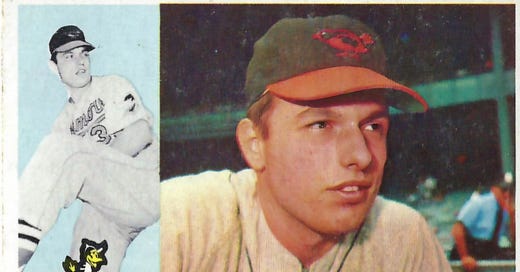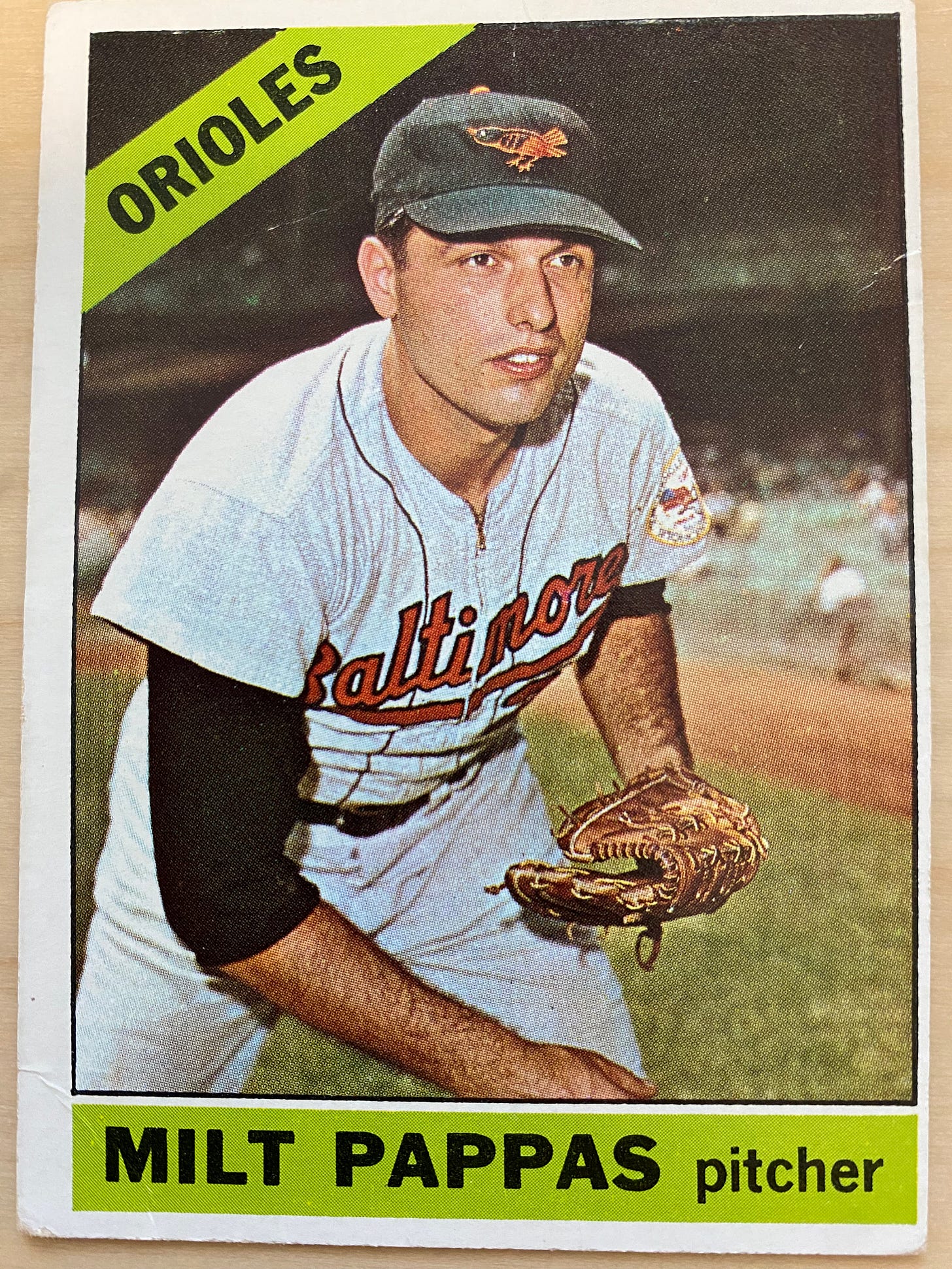The Bird Tapes Interview: Milt Pappas
He is one of the best pitchers ever signed by the Orioles, but when we spoke in 1999, he was more interested in airing grievances.
To interview Milt Pappas for my book on Orioles history a quarter-century ago, I made a special trip to the small Illinois town where he lived. One of his former teammates, Steve Barber, had told me, “No one could stand the guy,” referring to Pappas. I needed to investigate.
Pappas welcomed me at his front door. Still long and lean at age 60, he was up for delving into his long career — a right-hander with command of a mix of pitches, he had thrown 3,186 innings in the major leagues. That’s a lot.
We went back and forth in his den for several hours as my microcassette recorder ran. But he didn't tell the story that best summed him up until we were saying our goodbyes and my recorder was packed away.
Rightly or not, Pappas is best known as the trade chip that brought Frank Robinson to Baltimore in 1966, helping the Orioles rise from contenders to World Series champs. Months after the trade, Pappas told me, a photographer asked him to pose for a picture with Robinson before a spring training game in Florida between the Orioles and Cincinnati Reds, Pappas’ new team. Robinson refused to come out of the clubhouse and pose, according to Pappas, who perceived the snub as a slight and never forgot it.
He exacted his measure of revenge six years later, he told me, when he was pitching for the Chicago Cubs in 1972 and Robinson played for the Los Angeles Dodgers.
“I was starting, and I told my catcher, Randy Hundley, ‘Something’s going to happen today. I’m not going to tell you because then you’d know, but I’m just telling you, something’s going to happen,’” Pappas told me. “Hundley says, ‘Fine, whatever.’ So Frank comes up in the first inning and I knock him down, throw a fastball right at him. He gets up cussing and screaming, ‘That SOB is throwing at me.’ I strike him out. Next time up, same thing, I knock him down, he gets up screaming. He asks Hundley what the hell is going on, and Hundley says, ‘I have no idea, Frank.’
“Then it happens a third time. Frank is in the dirt again and gets up yelling, ‘Throw that SOB out of the game; he’s trying to kill me.’ I threw at him all three times and struck him out all three times. After the game, Hundley says to me, ‘Jesus Christ, Milt, what’d that guy ever do to you?’ I said, ‘He wouldn't take a picture with me in spring training six years ago.’ Hundley says, ‘Boy, you sure do carry a grudge.’ I said, ‘Well, maybe, but that’s the way it is.’”
Indeed, grudges, slights, grievances and paybacks were very much “the way it is” with Pappas. They’re a constant thread running through our salty interview, which is available below to paid Bird Tapes subscribers
To be clear, Pappas didn’t get salty with me personally; rather, he just told story after story in which he was misunderstood, undervalued, underpaid … on a short end of some sort, clearly still to his dismay years later.
We spent a lot more time discussing all that than his excellent pitching career.
Yes, he said, it was true his Baltimore teammates didn’t like him, especially early in his career. And it also was true, he said, that a) the Orioles lied to him before they traded him, b) bad calls cost him a perfect game late in his career, c) he didn’t like umpires, period, d) he complained to Reds management so much that they traded him, and e) modern players have no clue how good they have it.
Those are just some of the stories. There are more.
Fortunately, he also recounted his unusual journey in the game. A Detroit native, he signed a “bonus baby” deal with the Orioles in 1957 when his hometown Tigers lowballed him, which meant he went straight from high school to the major leagues, where, he said, his jealous teammates wanted nothing to do with him.
“A lot of people wanted to see me fail,” he said.
Many bonus baby pitchers did fail, including some with the Orioles; going from high school to the majors wasn't a good idea. But Pappas made it. After debuting in the majors at age 18, he went on to win 110 games for the Orioles, and then, after he was traded, won 99 more in the National League before his career ended at age 34.
His 209 career wins are more than every pitcher ever signed by the Orioles except Jim Palmer, Mike Mussina and Dennis Martinez.
In our interview, Pappas, who died at age 76 in 2016, generously credits Paul Richards for making it all possible. Given unchecked control of the Orioles’ baseball operation as the manager and/or GM from 1955 through 1961, Richards gambled on a generation of young pitchers, believing they could thrive in the majors by age 20.
The best thing that ever happened to him, Pappas said, was Richards putting him on an 80-pitch limit when he was new to the majors. “That enabled me to have a 17-year career,” he said.
It also enabled him to back up the trash talk he wasn't afraid to dispense.
“I was brash,” he told me, chuckling about it years later.
For the record, he was perfectly pleasant during our time together. But as I walked away, I guess I sort of understood why he wasn’t so popular with teammates, umpires, management or opponents. He was never afraid to identify and confront perceived wrongs. And he didn’t deny the “clubhouse lawyer” label many had put on him, fully admitting he was always litigating issues.
Not all of the bad blood he engineered was fair. After the Orioles traded him, manager Hank Bauer complained that he would pitch five or six innings and start looking to come out of games, a tacit knock on his determination and professionalism. But it’s a curious dart to throw at a pitcher who tossed 82 complete games for the Orioles. That’s a lot.
Pappas probably is underrated by many as a pitcher when you consider his 3.40 lifetime ERA, his 129 career complete games, his excellent career wins-above-replacement figure of 43.7 and the no-hitter he threw at age 33. That’s good stuff — so good that Pappas told interviewers (not me) later in life that he thought he belonged in the Hall of Fame.
Few voters agreed with him.
It was another grievance.
I’m sure he just shrugged. But let it go? Forget about it.
(To hear my interview with Pappas and gain access to my entire archive of interviews with Orioles legends, click this link and upgrade to a paid subscription.)
Keep reading with a 7-day free trial
Subscribe to The Bird Tapes to keep reading this post and get 7 days of free access to the full post archives.






